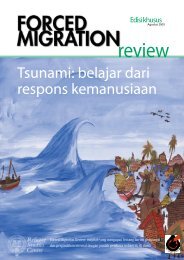FMR 42 full issue pdf - Forced Migration Review
FMR 42 full issue pdf - Forced Migration Review
FMR 42 full issue pdf - Forced Migration Review
Create successful ePaper yourself
Turn your PDF publications into a flip-book with our unique Google optimized e-Paper software.
<strong>FMR</strong> <strong>42</strong><br />
Sexual orientation and gender identity and the protection of forced migrants 9<br />
Mental health challenges of LGBT forced migrants<br />
Ariel Shidlo and Joanne Ahola<br />
Many LGBT forced migrants have significant and sometimes incapacitating psychological<br />
scars. Mental health providers can assist in documenting the psychological impact of anti-<br />
LGBT persecution and its impact on the ability to secure refugee status.<br />
Lesbian, gay, bisexual and transgender (LGBT)<br />
forced migrants around the world report a<br />
history of multiple traumatic events across<br />
their lifespan. The range of events includes<br />
verbal, emotional, physical and sexual abuse<br />
and assault, harassment, shunning, spitting,<br />
discrimination in housing and employment,<br />
destruction of property, blackmail, forced<br />
prostitution, forced heterosexual marriage,<br />
‘corrective rape’ 1 and coerced sexual<br />
orientation conversion interventions. Those<br />
who from a young age are perceived by<br />
others as behaving in gender non-conforming<br />
ways are targeted starting in childhood. 2<br />
social anxiety, traumatic brain injury and<br />
substance abuse. LGBT forced migrants may<br />
also suffer from two types of Post-Traumatic<br />
Stress Disorder: PTSD and complex PTSD. PTSD<br />
includes the symptom triad of re-experiencing<br />
traumatic events, numbing and avoidance of<br />
thinking about these events, and hyper-arousal.<br />
Those who have a history of cumulative trauma<br />
may suffer from the symptoms not only of PTSD<br />
but also of complex PTSD which include selfdestructive<br />
behaviour, amnesia, intense shame,<br />
difficulties with intimacy, experiencing bodily<br />
pains in response to psychological distress, and<br />
despair about finding loving relationships.<br />
LGBT persons who are victims of sexual<br />
orientation and gender identity (SOGI)-<br />
based violence seldom find comfort in their<br />
families, either because they are not ‘out’ to<br />
their families or because their families join<br />
in their persecution. LGBT forced migrants<br />
are distinct from other persecuted groups in<br />
that their families of origin often contribute<br />
to the abuse. Many LGBT forced migrants<br />
report emotional, verbal, physical and sexual<br />
violence at the hands of their family. A Peruvian<br />
woman who was non-gender conforming was,<br />
from an early age, emotionally and physically<br />
abused by her family; she was not allowed to<br />
eat with the rest of the family and, unlike her<br />
siblings, was not given a bed to sleep in. A<br />
Colombian woman reported feeling sad, angry<br />
and isolated when, after an anti-LGBT assault<br />
by the police, she could not go to her family<br />
for help and emotional support as that would<br />
have necessitated coming out to her family.<br />
Psychological consequences<br />
Many suffer from significant mental health<br />
consequences as a result of a lifetime of<br />
cumulative trauma. Common diagnoses are<br />
recurrent depression, dissociative disorders,<br />
panic disorder, generalised anxiety disorder,<br />
Adjudicators expect coherent, consistent and<br />
sequential accounts of persecution. But a<br />
person’s survival of persecution sometimes<br />
necessitates amnesia and denial of the impact<br />
and severity of traumatic events. Memories of<br />
trauma may be stored as fragments – images,<br />
sounds, smells and physical sensations –<br />
rather than as a verbal narrative, and this<br />
poses challenges to recounting a history<br />
of persecution. Furthermore, repeated<br />
retelling of a history of persecution can be<br />
re-traumatising for the forced migrant and<br />
cause secondary trauma to advocates and<br />
adjudicators. When a mental health provider<br />
is available they can utilise techniques that<br />
may minimise the level of re-traumatisation. 3<br />
Assessing SOGI<br />
In the absence of a safe environment, many<br />
LGBT individuals are not able to work through<br />
the internal processes necessary to allow<br />
them to integrate the multiple aspects of their<br />
sexuality. Instead, these processes may slow<br />
down or become ‘frozen’ until they reach the<br />
relative safety of a new host country. Because<br />
the coming-out process may only begin to<br />
unfreeze many years after arrival in the host<br />
country, some individuals may have difficulty




